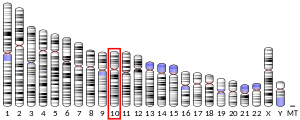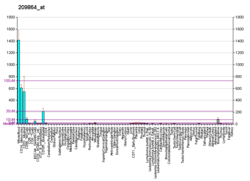FRAT2
GSK-3-binding protein FRAT2 is a protein that in humans is encoded by the FRAT2 gene.[5][6][7]
| FRAT2 | |||||||||||||||||||||||||
|---|---|---|---|---|---|---|---|---|---|---|---|---|---|---|---|---|---|---|---|---|---|---|---|---|---|
| Identifiers | |||||||||||||||||||||||||
| Aliases | FRAT2, WNT signaling pathway regulator, FRAT-2, FRAT regulator of WNT signaling pathway 2 | ||||||||||||||||||||||||
| External IDs | OMIM: 605006 MGI: 2673967 HomoloGene: 8095 GeneCards: FRAT2 | ||||||||||||||||||||||||
| |||||||||||||||||||||||||
| |||||||||||||||||||||||||
| |||||||||||||||||||||||||
| |||||||||||||||||||||||||
| Orthologs | |||||||||||||||||||||||||
| Species | Human | Mouse | |||||||||||||||||||||||
| Entrez | |||||||||||||||||||||||||
| Ensembl | |||||||||||||||||||||||||
| UniProt | |||||||||||||||||||||||||
| RefSeq (mRNA) | |||||||||||||||||||||||||
| RefSeq (protein) | |||||||||||||||||||||||||
| Location (UCSC) | Chr 10: 97.33 – 97.33 Mb | Chr 19: 41.85 – 41.85 Mb | |||||||||||||||||||||||
| PubMed search | [3] | [4] | |||||||||||||||||||||||
| Wikidata | |||||||||||||||||||||||||
| |||||||||||||||||||||||||
The protein encoded by this intronless gene belongs to the GSK-3-binding protein family. Studies show that this protein plays a role as a positive regulator of the WNT signaling pathway. It may be upregulated in tumor progression.[7]
References
- GRCh38: Ensembl release 89: ENSG00000181274 - Ensembl, May 2017
- GRCm38: Ensembl release 89: ENSMUSG00000047604 - Ensembl, May 2017
- "Human PubMed Reference:". National Center for Biotechnology Information, U.S. National Library of Medicine.
- "Mouse PubMed Reference:". National Center for Biotechnology Information, U.S. National Library of Medicine.
- Yost C, Farr GH 3rd, Pierce SB, Ferkey DM, Chen MM, Kimelman D (Jul 1998). "GBP, an inhibitor of GSK-3, is implicated in Xenopus development and oncogenesis". Cell. 93 (6): 1031–41. doi:10.1016/S0092-8674(00)81208-8. PMID 9635432.
- Saitoh T, Moriwaki J, Koike J, Takagi A, Miwa T, Shiokawa K, Katoh M (Mar 2001). "Molecular cloning and characterization of FRAT2, encoding a positive regulator of the WNT signaling pathway". Biochem Biophys Res Commun. 281 (3): 815–20. doi:10.1006/bbrc.2001.4421. PMID 11237732.
- "Entrez Gene: FRAT2 frequently rearranged in advanced T-cell lymphomas 2".
Further reading
- Bonaldo MF, Lennon G, Soares MB (1997). "Normalization and subtraction: two approaches to facilitate gene discovery". Genome Res. 6 (9): 791–806. doi:10.1101/gr.6.9.791. PMID 8889548.
- Bax B, Carter PS, Lewis C, et al. (2002). "The structure of phosphorylated GSK-3beta complexed with a peptide, FRATtide, that inhibits beta-catenin phosphorylation". Structure. 9 (12): 1143–52. doi:10.1016/S0969-2126(01)00679-7. PMID 11738041.
- Freemantle SJ, Portland HB, Ewings K, et al. (2002). "Characterization and tissue-specific expression of human GSK-3-binding proteins FRAT1 and FRAT2". Gene. 291 (1–2): 17–27. doi:10.1016/S0378-1119(02)00594-2. PMID 12095675.
- Strausberg RL, Feingold EA, Grouse LH, et al. (2003). "Generation and initial analysis of more than 15,000 full-length human and mouse cDNA sequences". Proc. Natl. Acad. Sci. U.S.A. 99 (26): 16899–903. doi:10.1073/pnas.242603899. PMC 139241. PMID 12477932.
- Deloukas P, Earthrowl ME, Grafham DV, et al. (2004). "The DNA sequence and comparative analysis of human chromosome 10". Nature. 429 (6990): 375–81. doi:10.1038/nature02462. PMID 15164054.
- Gerhard DS, Wagner L, Feingold EA, et al. (2004). "The status, quality, and expansion of the NIH full-length cDNA project: the Mammalian Gene Collection (MGC)". Genome Res. 14 (10B): 2121–7. doi:10.1101/gr.2596504. PMC 528928. PMID 15489334.
- Stoothoff WH, Cho JH, McDonald RP, Johnson GV (2005). "FRAT-2 preferentially increases glycogen synthase kinase 3 beta-mediated phosphorylation of primed sites, which results in enhanced tau phosphorylation". J. Biol. Chem. 280 (1): 270–6. doi:10.1074/jbc.M410061200. PMID 15522877.
This article is issued from Wikipedia. The text is licensed under Creative Commons - Attribution - Sharealike. Additional terms may apply for the media files.




